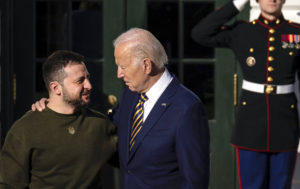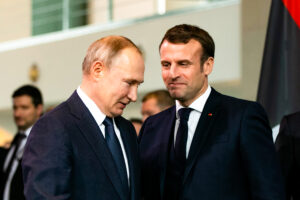In the month that has passed since Emmanuel Macron issued his call for greater European strategic autonomy, two rival camps have gone to battle over its legacy. The first is populated by Atlanticists such as European Commission president Ursula von der Leyen, outraged by Macron’s alleged ingratitude towards US security guarantees and his suggestion that Europe must consider its own strategic interests independent from Washington. The second contains Macron’s neo-Gaullist and pan-European supporters, such as European Council president Charles Michel, who praised him for standing up to Washington with a vision of the European Union as the alternative “third pole” to China and the United States in a multipolar world.
Both responses were entirely predictable; and both suffer from a similar misapprehension about the emerging paradigm of international relations today and the structural shifts on the horizon.
From the Euro-Atlantic standpoint, the Russian invasion of Ukraine was a galvanising event. The war reforged a long-dormant Manichaean framing of existential conflict between Russia and the “West”. What is, for Ukraine, a physical and territorial conflict thus assumed ontological, apocalyptic dimensions. In the spiritual fires of the war, the myth of the “West” was rebaptised. For a Nato that was seeking a mission ever since the fall of the Soviet Union, here was an opportunity to renew its institutional and ideological rationale, as well as to project solidarity in an the face of an emergency crisis.
From the perspective of America’s elites, meanwhile, the Ukraine war has underscored Europe’s profound military dependence on Washington and further reinforced the US-centric basis of transatlantic relations. Not only did it ostensibly justify their long-held position that Europe must pay a much larger share for the privileges of a US security guarantee, but the debate over the strategic worth of Nato and its enlargement was effectively silenced. Since the invasion, the alliance has already expanded to Finland, while Sweden remains in the process of accession. All of this was cause for celebration, if not triumphalism, in liberal internationalist circles: America, along with the Western order it sponsors against great power challengers such as China, appeared to be vindicated.
It was not surprising, then, that Macron’s remarks drew the ire of the Atlanticist foreign policy establishment, who not only falsely conflate the transatlantic relationship with Nato and measure its health in terms of Nato’s strength and durability but, crucially, have also internalised America’s Wilsonian and “Nato-centric” approach to European security. For them, the endurance of Nato as a permanent alliance serves as an effective hedge to the formation of a European defence force independent of Washington. Yet, the alliance is also an instrument for continued American influence over European policy. As Ronald Steel presciently wrote in the Sixties: “There is more than one kind of empire, more than one way of exerting control over others, and more than one justification for doing so.”
In his war memoirs, former French general and president Charles de Gaulle certainly agreed, calling Nato a “false pretence” designed to “disguise America’s chokehold over Europe”. The Americans, he argued, “should recognise that the United States’ best ally is not the one who grovels before them, but the one who knows how to say no to them”. Yet, de Gaulle, a proud European aristocrat who had had to deal with an imperious Franklin Roosevelt during the Second World War, was also more pessimistic about the future direction of US policy, fearing Americans had developed “that taste for intervention in which the instinct for domination cloaked itself”.
Across the Atlantic, de Gaulle’s views found parallels with those of America’s original cold warriors, such as George Kennan and Dwight D. Eisenhower. “If in 10 years”, observed then-Presidential-candidate Eisenhower in 1951, “all American troops stationed in Europe for national defence purposes have not been returned to the United States, then this whole [Nato] project will have failed”. Recognising the strategic value of the Europeans as equal and sovereign partners, Eisenhower understood that US policy should aim to foster a separate transnational defence force in Western Europe with the capacity to eventually become fully self-reliant.
Some seven decades later, it appears we have gone full circle. More than a year after Russia’s invasion of Ukraine, the sense of consensus produced by the tragic war is slowly dissipating. As French President Emmanuel Macron noted, with America shifting its strategic focus to Asia, the question of European strategic autonomy is no longer academic but vital if Europe wants to be one of the “poles” in the emerging multipolar world, rather than a vassal of Washington.
Yet there is also a different, more complex story here, too. Notwithstanding their questionable practicality, recent calls for a collective defence initiative premised on European unity and its claims to shared identity paradoxically suffer from a globalist and Caesarist predisposition: not only are they wedded to the project of European integration designed to keep Franco-German elites in a position of primacy, but their cast of mind seems entranced by the notion of great power competition on a global scale.
Indeed, Macron has internalised the epistemological basis of modern international relations theory and its stubborn fixation on global realpolitik. This reflects the far-too-common modern bias towards the world as the spatial setting of choice for both life and strife. “The fundamental event of modernity”, as Heidegger wrote, “is the conquest of the world as picture.” Within this distortive vision, to stay relevant, an entity — whether individual, national, or organisational — must develop the capacity to influence the global, because one draws existential meaning from the hope of mastering the world as such.
However, the return of geopolitics and militarisation to Europe has also exposed the reality of internal competition between the different blocs of states over the contours of any collective agenda — a reality that will inevitably force a more inward reckoning about what it means to be European. While Macron is focused on the projection or exteriorisation of European power to compete on a world scale, the interiorisation of Europe is more likely — a process forming new axes and blocs in response to the new regional and geopolitical realities in the continent.
In fact, for all the talk of Western unity inspired by the war in Ukraine, we are beginning to see cracks in the ranks within the Nato alliance. There are two main reasons for this. First, the American push for Nato expansion since 1991 has enlarged the alliance by adding a host of faultline states or “regional balancers” from Central and Eastern Europe (CEE). The strategy, which began with the Clinton administration but was fully championed by the George W. Bush administration, was to create a decidedly pro-American pillar on the continent centred on Warsaw, which would force an eastward shift in the alliance’s centre of gravity away from the traditional Franco-German axis.
By using Nato enlargement to weaken the old power centres in Europe that might have occasionally stood up to it (such as in the run-up to the invasion of Iraq), Washington ensured a more compliant Europe in the short-term. The upshot, however, was the formation of a 31-member behemoth made up of three distinct categories of states with deep asymmetries of power and low compatibility of interests. As I recently argued with Zachary Paikin:
“The alliance now essentially consists of three tiers: a globe-spanning and maritime great power, the United States (with its closely-aligned Anglo partners in Canada and the UK); a number of continental ‘middle powers‘ with different views on the desirability or viability of the US-led postwar international order including France, Germany, and Turkey; and a collection of states in and around the post-Soviet space led by Poland, which serve as ‘regional balancers’ against both historical European powers and Russia.”
Nato, as a consequence, has become a highly heterogeneous alliance, in which members have different security priorities and threat perceptions, increasing the likelihood of irreconcilable rifts between Western European states and their CEE counterparts, especially as the United States pivots to the Pacific. In other words, Nato’s very expansion could likely be the cause of its ultimate breakdown into at least two different alliance structures, ententes, or minilateral regional arrangements.
Meanwhile, the nominally North Atlantic military alliance is no longer confined to the European theatre, let alone its original basis in Western Europe and the Atlantic region. By adopting US policy priorities since the Cold War, the alliance has metastasised into a global collective military conglomerate that not only extends to Eastern Europe but stretches across Eurasia and into the Pacific, with its latest outpost just opening in Japan.
Although CEE leaders such as Polish Prime Minister Mateusz Morawiecki continue to double down on the United States as “the absolute foundation” of security in “our part of Europe”, most European nations still choose to placate Washington, even if they have little interest in stepping up the escalation ladder in places such as Taiwan. Predictably, the imperative one feels to project solidarity with Washington lessens the further West one goes in Europe and the further away one gets from the ontological presence of the Russian threat.
While Macron espouses a pan-European, EU-centric model of security through which he hopes to leverage France as a major power on the world stage, the reality is that the EU’s institutional sovereignty cuts against the geopolitical interests and national sovereignty of smaller member states — and more acutely so given that a similar “Easternisation” has also occurred in relation to the EU with Ukraine, Moldova and even Georgia slated to become future member states. While they are much more likely to fear abandonment by Washington, these post-Soviet states are, ironically, far more sovereigntist, conservative, and nationalistic, tending to resist the liberal institutionalist and integrationist agenda of their Western European counterparts. Indeed, the frenzied backlash to Macron’s warnings about European entanglement in Taiwan suggests that a power struggle may already be underway in the EU. As such, the entrenched disagreements over a shared EU strategy toward China could well become the catalyst for a future split in Europe along a West-East axis.
Ultimately, the return of geopolitics catapulted by Russia’s invasion of Ukraine has meant that the proper expanse of “Europe” as well as its security identity is once again in doubt. This is a tale of divergent strategic interests among competing “allies” seeking to secure one another’s conformity: each side looking to impose their interests and ontological vision as the sine qua non of the Western alliance.
And, over the medium to long term, this new reality informs European states’ relations both toward external actors and among themselves. On the one hand, continental Europe must determine the proper scope of its relationship with the United States (and the Atlanticist Anglosphere). On the other, it must increasingly contend with the divergent approaches toward Moscow by Eastern and Western factions which will likely also affect their future postures toward Beijing (the former seeking the complete expulsion of Russia from European affairs, the latter hoping for an eventual normalisation of relations).
As it struggles to resolve the Russia question, Europe thus finds itself having to re-examine its identity as a distinct cultural and geopolitical realm, recalibrate its proper boundaries, and discover its strategic orientation (and voice) vis-à-vis a “collective West” premised on US-led Atlanticism. It is here that the continent’s long history might serve as a guide.
As it expanded, the Roman Empire simply became too large, finding it difficult to reconcile the increasingly incompatible priorities of its different regions. Overextension has always been the mother of entropy, and the declining Roman Empire lacked the resources and military capacity to respond in a unified way to the disparate security concerns of its eastern and western quadrants. This was perhaps the primary reason why Emperor Theodosius formalised an already-growing division between the two halves of the Roman world, so that each could better respond to its immediate security challenges. While the West remained preoccupied with ongoing economic problems and barbarian incursions along the Germanic frontier, the East organised itself to confront the persistent challenge of its peer-competitor, the Sassanian Empire. Simply put, the Romans had to split into two Romes in order to more effectively meet a plethora of systemic challenges.
The Roman example is certainly not a perfect analogy for today’s Europe, but it is instructive. Present-day Europe is much more stable and formidable compared to the late Roman era, with neither bloc facing the prospect of imminent collapse. Nevertheless, as with the late Rome, today a split along the Franco-German and Polish axes would reflect the differing strategic priorities of the two sides. Over time, this might mean the expiration of Nato as a project and its replacement by two alternate minilateral security ententes — one in Western Europe centred on Germany and France and the other in Northeast Europe anchored in Poland and the Baltic states sympathetic to it.
In any such future realignment, the German question remains the key conundrum. There, the rise of the Green Party, personified by the über-hawk and Americanist foreign minister Annalena Baerbock, is outrightly undermining Germany’s concrete national interest and industrial sector. Under the cover of “Europeanism”, such German liberal internationalists are engaged in a sort of a Faustian bargain with the United States and its key CEE allies in which Berlin acquiesces to Nato’s eastward shift in Europe for the sake of greater control over the defence and economic imperatives of the alliance. This is unsustainable in the long term, not only because it is wholly dependent on America’s continuing presence in Europe but also as it contradicts the interests of Western Europeans, who would have to bankroll and sustain the military austerities which the East needs to confront a Russian threat that Western populations do not feel nearly as acutely.
Since the Second World War, partly as a result of the Cold War’s legacy and partly due to unrelenting Anglo-American interference, Europe is no longer the primary mover of world affairs. Instead, it has devolved into a regional theatre akin to the Middle East, in which competition among other great powers — for many decades Washington and Moscow — takes centre stage.
If this is to change — if Europe is to recover its geopolitical distinctiveness — its political leaders must first recognise that it is not a monolith, but a mosaic composed of different blocs. The idea of the “West” might be ontologically alluring or comforting in times of chaos and tragedy, but it is an illusion that weaponises collective paranoia for ideological unity, designed to decentre Europe and disenfranchise its various elements from pursuing their particular interests that may or may not oppose America’s crusades for global primacy.
At the same time, Washington, too, must adapt to the structural shifts and the increasing regionalisation that are shaping a polycentric world based around civilisational middle powers. Just as “Nato unity” is a mirage that is meant to rhetorically mask the shaky foundations of Western universalism as underwritten by US power, “European identity” is an equally ambiguous and problematic notion because, geopolitically speaking, there are at least two Europes with diverging security interests, value systems, and cultural pedigree. Choosing to ignore this division amounts to nothing more than kicking the can down the road — and risks breaking apart the Western alliance itself.
Disclaimer
Some of the posts we share are controversial and we do not necessarily agree with them in the whole extend. Sometimes we agree with the content or part of it but we do not agree with the narration or language. Nevertheless we find them somehow interesting, valuable and/or informative or we share them, because we strongly believe in freedom of speech, free press and journalism. We strongly encourage you to have a critical approach to all the content, do your own research and analysis to build your own opinion.
We would be glad to have your feedback.
Source: UnHerd Read the original article here: https://unherd.com/




